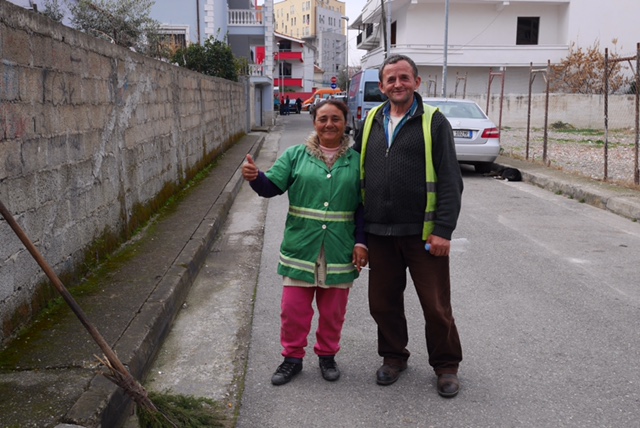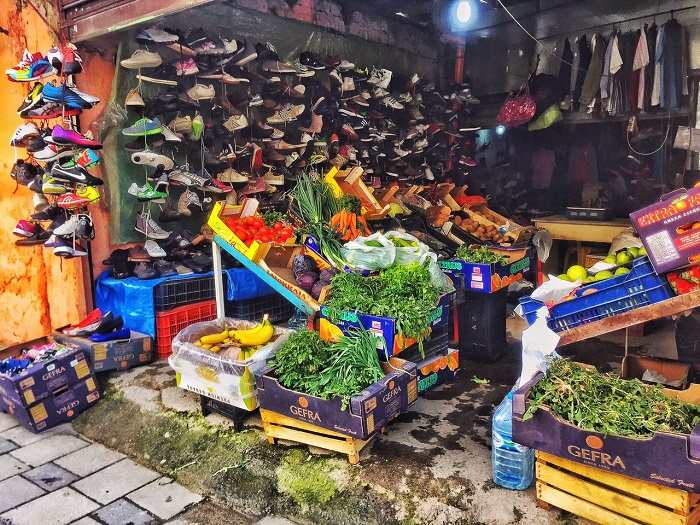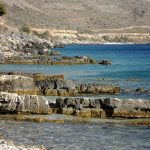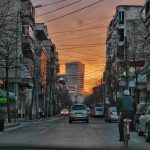Sitting in a park on a wind-chilled 18-degree sunny pre-spring day here in Tirana, it’s easy to feel life is good.
To quickly address my health and life post-hysterectomy, the word I can sum it all up with is “Wow.” Overnight, my health has done a 180, and my mindset has too. After years of blaming myself for “failing” to be healthy, I’ve learned I coulda mainlined the fountain of youth and I still would’ve been a shadow of my former self. My uterus had to go, man. Several fibroids were devouring my health and crushing organs. Ain’t no juicing regime that’s gonna clear that up.
But now? I’m amazing. Feet problem, walking issues, breathing shortness, face acne, weight – it’s all gone or seriously reversing. A decade of ill health is vanishing overnight. And I am so damn grateful.
The whole world literally awaits me. My recovery gives me the gift of better travels, more energy, painless walking, motivation, positivity, and exuberance. Thanks, doctors! I’ve been scienced!
Believe it or not, this is the difference in 16 days after surgery. On the left is the day I checked into the hospital, and the right was yesterday.
(This post was written a week ago, but hey, I’ve been preoccupied.)

So, the left was the morning of February 27th, when I was terrified of surgery and hoping it’d fix a few things wrong with me. The right is 03/16, when I’m shocked by such a reversal in so many health problems. 🙂
Tirana: Taking Stock
So, Albania.
Tirana’s architecture is sub-par, for the most part, but I have a lot more to hopefully see, so the verdict is out. Still, first thoughts are: it’s a rag-tag rumbled rundown town, but, man, I think I love this place.
The people are both hardened and rejuvenated. 27 years ago marked the end of their tyrannical dictatorship. Two years later they had elections. Five years after that, the government’s banking schemes saw $1.2 billion of personal wealth lost to Ponzi schemes for a country of only 3 million citizens. Immediately afterwards, civil war broke out and nearly 4,000 would die in the six months of battle that led to the toppling of their government.
20 years later, they’re eyeballing capitalism, trying to shake off the shackles of ongoing corruption, but I think they largely view the future with hope.
Don’t Mind Me, I’m Canadian
Walking around, I’m clearly a tourist. People here have a complexion that’s a mix between Greek and Turkish. Dark hair, olive skin. I am not one of them. They all know I’m not living here. The wandering-about-in-a-daze-LOOK-SHINY thing makes that as clear as day.
People either talk to me because they speak English or wish they could. Little boys give me big-ass grins and thumbs-up for finding their country worth visiting. Adults smile and nod if I catch their eyes. Workers yesterday pointed at my camera, said “click-click” and allowed me to get their photo. Another English-speaker chatted me up in a café and said he’d lived and worked in Canada for three years, and loves-loves-loves Calgary.

Click-click! Pose-pose! Note the broom made with actual twigs, like they do in other countries like Mexico too.
When people learn I’m Canadian, they light up. Mechanics surrounded the police who chatted me up yesterday, telling them things to translate, like Canada is their dream, Canada is the best country in the world. They want to hear what I have to say and love that I’m saying it.
Food! I’ll Have What I’m Having, Please
Then there’s the food. A shared border with Greece means there’s a ton of Grecian influences in the food here. Xaxiq is their take on tzatziki, but you’ll pay 65% less to enjoy it here. I just had a ginormous chicken Caesar salad (spoiler: caesars are different in Europe for some weird reason), the local national bread (like ciabatta had dirty sex with Greek puffy pita), 4 lamb kofta-esque kebabs (qofte), and a half-litre of red wine for $8.50 Canadian. I’m also in love with Kernacka, another kind of grilled “meatball.” The same meal would cost me $20+ in Greece. They’re across the Adriatic pond from Italy, too, making them pretty kick-ass at Italian food and coffee. OH, THE COFFEE.
Espresso in cafes goes from 50 cents to $1.20 for upscale places. A latte or cappuccino runs around $1.00 to $1.50. Two scoops of gelato is about anywhere from 50 cents to $1.20. A loaf of artisanal old-world bread runs around $1-1.75 in bakeries.

Pictured here is, from top left, qofte, then salce kosi (yogurt sauce, but I prefer xaxiq), simite (their amazing ciabatta-meets-pita bread), and fergese, a roasted peppers and feta concoction that I love and is one of the national dishes here.
Don’t Know Why I Love It, But I Do
If you obsess about upscale amenities, high-end dining, cultural high-points, and impressive architecture, then Albania is certainly not for you.
But if real food, real people, a place in the throes of flux, a troubled past but promising future, and a deep, dramatic history are the kinds of things that tick your list, then maybe you’re made for Albania. Hell, maybe all the Balkans are for you. Personally, I love the Balkans and Albania is really delivering.
I’ll be here for another 6 weeks 5 weeks and look forward to healing in a country where, well, healing from a difficult past is something that is everywhere all around me. Strange, that. Fitting, too.
By the time I leave for Sarajevo on April 22nd, I hope I can share some of what makes Albania tick.
If you’ve been cheering me on, rooting for me, worrying about my health, crossing your fingers, saying your prayers, and tossing well-wishes into the wind, then thank you. I needed it, I benefited, and now I think I got this. I’m gonna be okay. In fact, I’m gonna be better than ever, and the whole world awaits me. Thank you for everything.

This is one of the bunkers, just one of some 180,000 plus in the country, now a graffiti masterpiece. There’s one bunker for every 17 Albanians, and approximately 5.7 in every square-kilometre.
But Wait! There’s More!
That’s where my initial post ended, so I’ll honour that. But I’ve been thinking a lot since that day in the park when a quite elderly man passed me by and looked me in the eye. In some people, the struggle seeps out like water from a dam. I did the math. If he was in his 80s, as I suspect, then he’d have been a child when the Italians invaded in WWII and Mussolini was the de facto dictator du jour.
In 1944, they got the boot and Enver Hoxha assumed power in Albania’s new independence, beginning a dictatorship that’d last to 1990. Then the rise to capitalism, the collapsing economy, the civil war, the new freedom, and then this exciting time of possibility with growing businesses and opportunities.
What a life. Few countries in the world have seen that much turmoil and change since 1939.

While capitalism is full-throttle here, there are those still eking out a living in shanty-type shacks, where they’re selling produce in half and other things on the other side. Are these people really hurting for money? Maybe. It’s one of the continent’s poorest countries. Or maybe they just like produce and thrifting. Either way: Balkans.
Complicated. Challenging. Amazing.
I think this is what fascinates me so much about the Balkans. I might be the kind of person who slows down to look at car accidents, but it’s driven by a hope that everyone gets out alive.
What really makes the Balkans so intriguing to me is that they’ve been the spark to the world’s powder keg for over a century now. World War I was begun in the Balkans. And World War II. They played a part in the fall of communism in 1989 and 1990, they erupted in brutal war soon after. And now they’re just struggling to find a new normal, a future of hope.
Years ago I read a couple books by Adam Hochschild, co-founder of the magazine Mother Jones. One was The Unquiet Ghost: Russians Remember Stalin, and the other was King Leopold’s Ghosts.

This country is full of fertile farming land, but it’s all on mountains even in Tirana, since this is one of the most mountainous countries in the world — 70% is hills and peaks. So, farming happens in terraces.
The first was a fascinating look at a country that never really acknowledged the depravity of life under Stalin and how Russians betrayed each other and were as complicit in the gulag hell as the secret police were. It looked at the toxic relationships and the dysfunctionality, the horrors unspoken and the struggle to carry on despite all that bleak, dark history. This came out in the late ‘80s, around the rise of Perestroika, so naturally things soon changed as communism tumbled, but it really intrigued me.
I mean, I know what it’s like to grow up in a dysfunctional home on the verge of divorce, but how do you live through that in a country of 150 million, where it was a land of secrets and lies, feuds and forgetting?
King Leopold’s Ghost was equally as fascinating but dark as hell, since it was about the first real genocide, where potentially 10 million or more people in the Congo met their deaths due to the rubber trade, Belgium’s dark overlord history.
Either way, they’re stories about people forced to heal and overcome from tyrannical paths. What does it do to a population?

I took a cable car and this was the last thing I saw. Nice ending there, cable car! Sunset over Tirana.
Looking Into the Light
For me, I sort of find that healing and recovery in the Balkans. Depending where you go, there’s the dark memories. For some, it’s simply a different time they lived under. For others, it’s a legacy of brutality. I’ve seen people shrug off the wars and others come to tears. It was something different for everyone, and for every country.
It’s part of why I’m so tempted to spend the whole of 2018 in this part of the world. Whether I will, meh, I don’t know. When the whole world is a possibility, it’s hard to pick, you know.
But when I see an old man like that from the Tirana park that day, giving me his steely-eyed gaze, I don’t see a crotchety old guy. I see someone who’s seen more than I’ll ever see, who’s been forged by the fires of experience, who has the right to stare some privileged outsider like me down.


